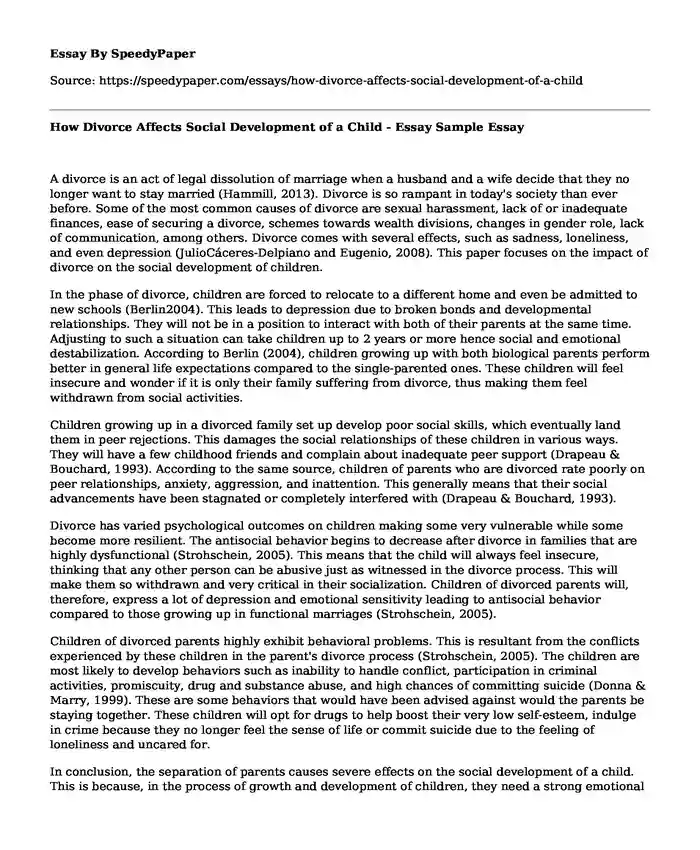
| Type of paper: | Essay |
| Categories: | Family Child development |
| Pages: | 3 |
| Wordcount: | 647 words |
A divorce is an act of legal dissolution of marriage when a husband and a wife decide that they no longer want to stay married (Hammill, 2013). Divorce is so rampant in today's society than ever before. Some of the most common causes of divorce are sexual harassment, lack of or inadequate finances, ease of securing a divorce, schemes towards wealth divisions, changes in gender role, lack of communication, among others. Divorce comes with several effects, such as sadness, loneliness, and even depression (JulioCáceres-Delpiano and Eugenio, 2008). This paper focuses on the impact of divorce on the social development of children.
In the phase of divorce, children are forced to relocate to a different home and even be admitted to new schools (Berlin2004). This leads to depression due to broken bonds and developmental relationships. They will not be in a position to interact with both of their parents at the same time. Adjusting to such a situation can take children up to 2 years or more hence social and emotional destabilization. According to Berlin (2004), children growing up with both biological parents perform better in general life expectations compared to the single-parented ones. These children will feel insecure and wonder if it is only their family suffering from divorce, thus making them feel withdrawn from social activities.
Children growing up in a divorced family set up develop poor social skills, which eventually land them in peer rejections. This damages the social relationships of these children in various ways. They will have a few childhood friends and complain about inadequate peer support (Drapeau & Bouchard, 1993). According to the same source, children of parents who are divorced rate poorly on peer relationships, anxiety, aggression, and inattention. This generally means that their social advancements have been stagnated or completely interfered with (Drapeau & Bouchard, 1993).
Divorce has varied psychological outcomes on children making some very vulnerable while some become more resilient. The antisocial behavior begins to decrease after divorce in families that are highly dysfunctional (Strohschein, 2005). This means that the child will always feel insecure, thinking that any other person can be abusive just as witnessed in the divorce process. This will make them so withdrawn and very critical in their socialization. Children of divorced parents will, therefore, express a lot of depression and emotional sensitivity leading to antisocial behavior compared to those growing up in functional marriages (Strohschein, 2005).
Children of divorced parents highly exhibit behavioral problems. This is resultant from the conflicts experienced by these children in the parent's divorce process (Strohschein, 2005). The children are most likely to develop behaviors such as inability to handle conflict, participation in criminal activities, promiscuity, drug and substance abuse, and high chances of committing suicide (Donna & Marry, 1999). These are some behaviors that would have been advised against would the parents be staying together. These children will opt for drugs to help boost their very low self-esteem, indulge in crime because they no longer feel the sense of life or commit suicide due to the feeling of loneliness and uncared for.
In conclusion, the separation of parents causes severe effects on the social development of a child. This is because, in the process of growth and development of children, they need a strong emotional bond to develop security, resilience, and coop with whatever challenges life always brings their way. Without this parental bond, they will grow sad, anxious, depressed, and low in self-esteem.
References
Donna R. Morrison and Mary Jo Coiro, "Parental Conflict and Marital Disruption: Do Children Benefit When High-Conflict Marriages Are Dissolved?" Journal of Marriage and the Family 61, (1999): 626
Drapeau, S., & Bouchard, C. (1993). Support networks and adjustment among 6 to 11 year-olds from maritally-disrupted and intact families. Journal of divorce & remarriage, 19(1-2), 75-98.
Hammill, S. (2013). Cultural Sociology of Divorce: An Encyclopedia. Reference Reviews.
Strohschein, L. (2005). Parental divorce and child mental health trajectories. Journal of Marriage and Family, 67(5), 1286-1300.
Cite this page
How Divorce Affects Social Development of a Child - Essay Sample. (2023, Dec 16). Retrieved from https://speedypaper.net/essays/how-divorce-affects-social-development-of-a-child
Request Removal
If you are the original author of this essay and no longer wish to have it published on the SpeedyPaper website, please click below to request its removal:
- Free Essay: Philosophy Regarding Children and Learning
- Lifespan Development Paper Sample
- Paper Example. Introduction to Early Childhood Education
- Free Essay on Business Expansion: Sustainability
- Free Paper Example on Carnal Screen (Sex in Cinema)
- Free Paper Sample on Children's Hospital
- My Teaching Philosophy for Early Childhood Education - Essay Example
Popular categories




